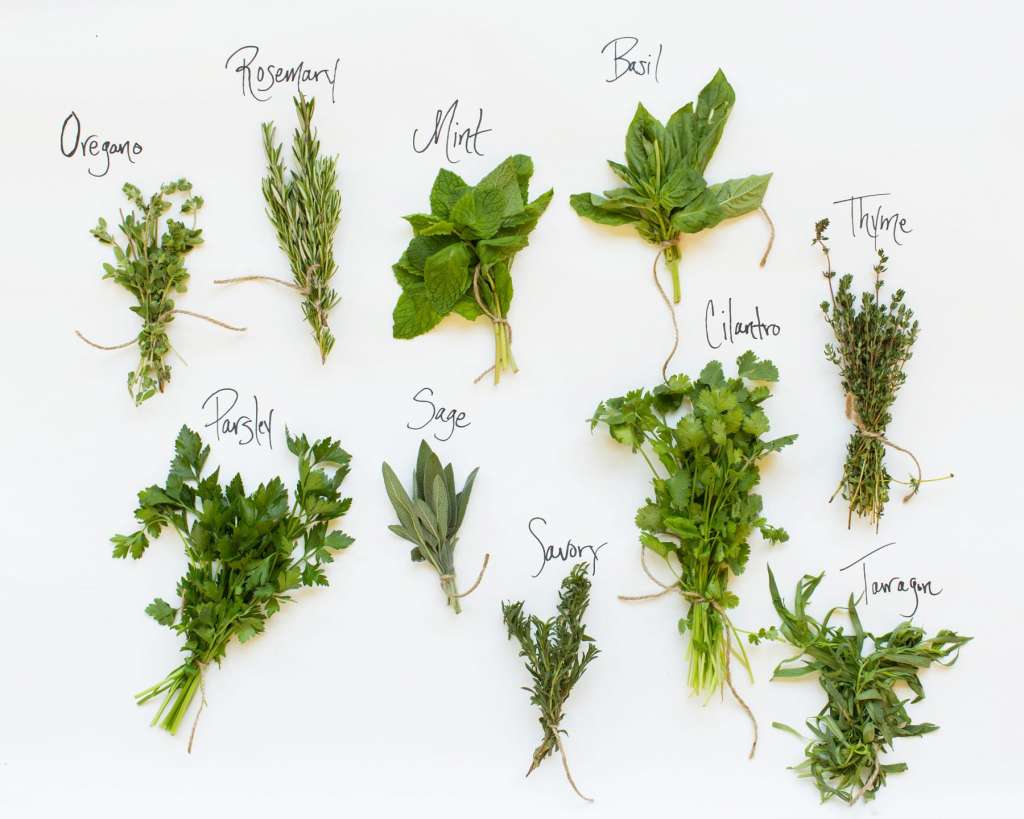The Healing Power Of Herbs

The chefs in our test kitchen are happily heavy-handed when it comes to fresh herbs. These fresh greens offer a lean, clean way to boost flavor while dramatically increasing the nutrient density of your meal. Most herbs are practically anti-everything: anti-inflammatory, antibacterial, antioxidant, antifungal, and antiviral. Researchers have found that herbs can help protect against the growth of harmful bacteria in ways that are more effective than traditional antibiotics, which commonly target a single pathway. Herbs function in a multi-pathway manner, offering more complex and effective healing powers.
From chronic disease prevention to everyday remedies for aches and pains, Sun Basket’s Director of Nutrition, Lindsey Kane, explains the health benefits of our favorite herbs.
Basil
The main ingredient in pesto is considered an antidepressant by some researchers because it can positively impact brain function, regulating the hormones responsible for making us happy and energetic. It’s great ingredient for anyone dealing with depression and anxiety. Additionally, basil has been shown to be both a fever and pain reducer, may help prevent diabetes, and protect the liver and blood vessels.
Cilantro
For thousands of years, herbalists have recommended cilantro to settle nausea, prevent gas and bloating, and ease stomach cramps. It aids in efficient digestion, and in many cuisines, it’s added to spicy dishes because its cooling effects can help prevent heartburn. Additionally, the vitamin K and calcium content of cilantro helps build strong bones, teeth, and hair. (To those of you who were cursed with the DNA-coded dislike for cilantro, fret not, most of cilantro’s health benefits can be found in other herbs, as well.)
Mint
This refreshing herb is commonly known for its ability to relieve an upset stomach. Mint promotes digestion by reducing gas and bloating, relaxing muscles and relieving stomach cramps. One study found that peppermint oil helped alleviate symptoms of IBS (irritable bowel syndrome).
Oregano
Gut health is important, and oregano has been shown to protect against foodborne illnesses so much so that there’s evidence that it can effectively treat bacterial infections without the side effects of traditional antibiotics or creating antibiotic superbugs. Additionally, oregano can function as a muscle relaxant and help prevent spasms associated with IBS.
Parsley
More than a garnish and breath-freshener, parsley is high in vitamin A, which supports the immune system and is critical to vision. Additionally, its high levels of vitamin C can help treat a common cold and reduce hypertension. One of parsley’s prevalent chemicals, apigenin, can help inhibit the growth of cancer cells.
Rosemary
Some studies have found that rosemary can be an antidote for allergies, thanks to its anti-inflammatory properties. The woody herb also fights oxidative damage associated with aging, Alzheimer’s, and heart disease.
Sage
Don’t limit this hardy herb to your Thanksgiving dressing—its healing powers date back centuries. Stemming from the Latin root “salvere”, which means “to save”, sage earned its name thanks to its widely accepted healing abilities. Aside from burning sage to ward off bad energy, it’s also known to improve brain function and memory for people of all ages, but it’s particularly helpful to those who suffer from Alzheimer’s.
Savory
Add this to your herb lineup when you don’t have much of an appetite, it’ll help spike your hunger while relieving GI distress or any indigestion that might be affecting your appetite. Savory can also help during cold season by relieving symptoms like coughs and sore throat.
Tarragon
The anise flavor in tarragon might remind you of the flavor of some alcoholic digestifs like Sambuca and Fernet. It’s been used since ancient times to aid in digestion. You can also count on it to help promote relaxation, making it a perfect addition to a sleepytime tea blend.
Thyme
This woody herb is higher in antioxidants than any of the others on our list. Add it to your meals for a boost in your overall health, to fight signs of aging, and cancer prevention. It’s also high in antifungal and antibacterial properties, which means that it can be used as a natural food preservative, preventing the growth of yeast, mold, and viruses.









